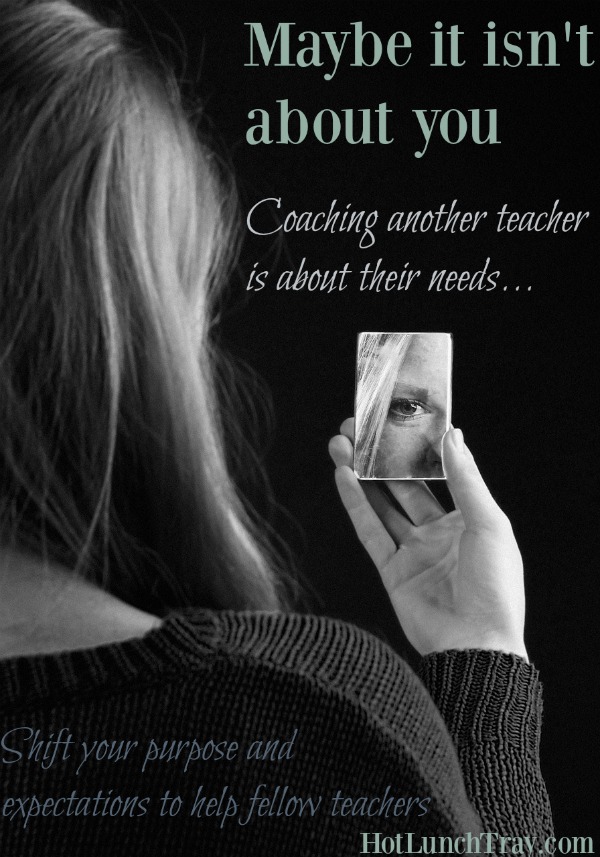Don’t get me wrong, you’re probably a rock star. But this isn’t about you. If you are an effective coach, it is about making the other teacher the rock star.
I personally struggle with that same drive that brought me to the classroom.
I want to try things my way, I already know what I know, and I do not know what I do not know. How do I quiet that force and listen to what the other teacher requires to take the next step in their profession? How do I make it not about me, but about them? How do I not just try to make them copies of me? How do I guard against just making each teacher I encounter a mirror to my tendencies?
I also had to adjust from passionately protecting students and their learning to protecting teachers and their learning. My biggest paradigm shift was from students which must listen to me and comply to teachers who do not have to listen, let alone do anything I ask. Before I can change the world with my next idea I literally have to invite an audience, never scare them off, and convince them to do “extra” work. So, I need to harvest all of my passion from my previous audiences and apply to this newer audience!
I need to adjust my content as well. When I was teaching we might have compared notes on how to engage students – these people are already doing that. I need to help them make how they are engaging those students (1) more efficient and (2) easier on them. I mention both of those because efficiency implies desirable results – students achievement, without which no position in a school receives much funding. A good coach makes the dots appear closer together to connect for teachers, “doing this gets you to that quicker/easier.”
 How do I keep my personal standards relative to myself, the actual standards present, but customize accomplishments to the teacher I am working with right then and there? It is a balancing act which is mostly art. The inglorious truth is that it is also an ugly battle of trial and error where I attempt to not get bogged down in the mist-steps, but celebrate the forward movements. To celebrate those, you must individualize your expectations per teacher. It is worth slogging through some of the harder stuff to hear appreciation in a teacher’s voice as they talk about an improved practice.
How do I keep my personal standards relative to myself, the actual standards present, but customize accomplishments to the teacher I am working with right then and there? It is a balancing act which is mostly art. The inglorious truth is that it is also an ugly battle of trial and error where I attempt to not get bogged down in the mist-steps, but celebrate the forward movements. To celebrate those, you must individualize your expectations per teacher. It is worth slogging through some of the harder stuff to hear appreciation in a teacher’s voice as they talk about an improved practice.
I see that I need to move the culture in which I am coaching. I need to engage administrators who may not be fully aware that this shift to digital learning environments is taking place, and I need to path the way for future Technology Coaches which we will eventually hire at each of our school buildings/in the district. Here is my action I am taking this month, I suggest something like this PLN book study I am participating in for April:
The complete book study schedule is available at https://bit.ly/ETCoachesBook
If you haven’t downloaded the FREE ebook yet, you can get it here https://drive.google.com/file/





2017-09-25 at 10:53 am
Penny, as usual a great read and needed reminder that as coaches we are servant leaders in education… it’s not about us, but about helping teachers solve THEIR problems of practice.
Katie Siemer recently posted…4 Resources to Help Define the Role of EdTech Coaches
2017-10-19 at 5:17 pm
Katie, that is always a good reminder, follow where any learner leads!
2017-10-19 at 11:23 am
I think this article makes me think about my own teaching practice. I try to think of my learners and how they learn. It is not about how I learn and this is how I want to teach. It is about what works for that teacher and those students.
2017-10-19 at 5:15 pm
That is a real art Janette! And it takes continual patience and practice. 😉